2010年高考英语试题及答案(北京卷)
- 格式:doc
- 大小:305.50 KB
- 文档页数:15
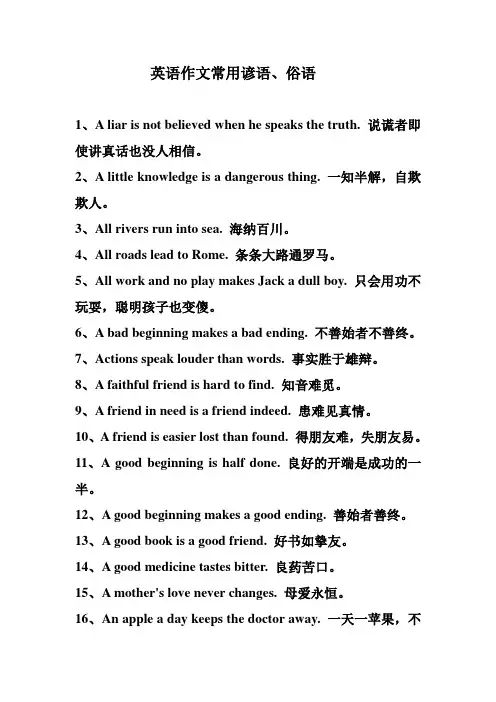
英语作文常用谚语、俗语1、A liar is not believed when he speaks the truth. 说谎者即使讲真话也没人相信。
2、A little knowledge is a dangerous thing. 一知半解,自欺欺人。
3、All rivers run into sea. 海纳百川。
4、All roads lead to Rome. 条条大路通罗马。
5、All work and no play makes Jack a dull boy. 只会用功不玩耍,聪明孩子也变傻。
6、A bad beginning makes a bad ending. 不善始者不善终。
7、Actions speak louder than words. 事实胜于雄辩。
8、A faithful friend is hard to find. 知音难觅。
9、A friend in need is a friend indeed. 患难见真情。
10、A friend is easier lost than found. 得朋友难,失朋友易。
11、A good beginning is half done. 良好的开端是成功的一半。
12、A good beginning makes a good ending. 善始者善终。
13、A good book is a good friend. 好书如挚友。
14、A good medicine tastes bitter. 良药苦口。
15、A mother's love never changes. 母爱永恒。
16、An apple a day keeps the doctor away. 一天一苹果,不用请医生。
17、A single flower does not make a spring. 一花独放不是春,百花齐放春满园。
18、A year's plan starts with spring. 一年之计在于春。

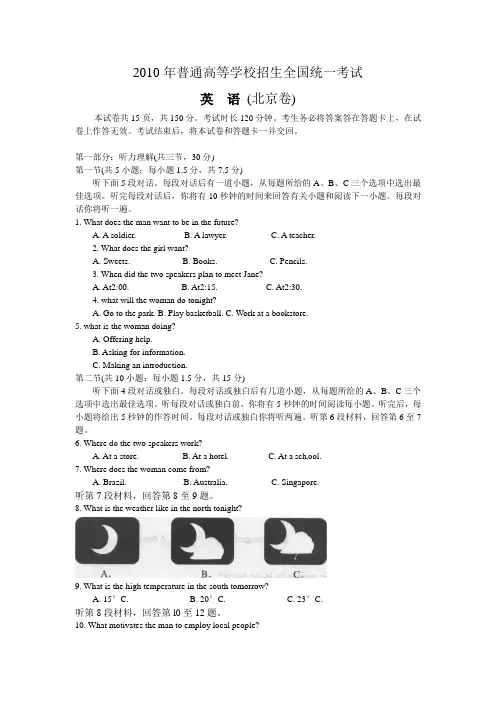
2010年普通高等学校招生全国统一考试英语(北京卷)本试卷共15页,共150分。
考试时长120分钟。
考生务必将答案答在答题卡上,在试卷上作答无效。
考试结束后,将本试卷和答题卡一并交回。
第一部分:听力理解(共三节,30分)第一节(共5小题;每小题1.5分,共7.5分)听下面5段对话。
每段对话后有一道小题,从每题所给的A、B、C三个选项中选出最佳选项。
听完每段对话后,你将有10秒钟的时间来回答有关小题和阅读下一小题。
每段对话你将听一遍。
1. What does the man want to be in the future?A. A soldier.B. A lawyer.C. A teacher.2. What does the girl want?A. Sweets.B. Books.C. Pencils.3. When did the two speakers plan to meet Jane?A. At2:00.B. At2:15.C. At2:30.4. what will the woman do tonight?A. Go to the park.B. Play basketball.C. Work at a bookstore.5. what is the woman doing?A. Offering help.B. Asking for information.C. Making an introduction.第二节(共10小题;每小题1.5分,共15分)听下面4段对话或独白。
每段对话或独白后有几道小题,从每题所给的A、B、C三个选项中选出最佳选项。
听每段对话或独白前,你将有5秒钟的时间阅读每小题。
听完后,每小题将给出5秒钟的作答时间。
每段对话或独白你将听两遍。
听第6段材料,回答第6至7题。
6. Where do the two speakers work?A. At a store.B. At a hotel.C. At a sch ool.7. Where does the woman come from?A. Brazil.B. Australia.C. Singapore.听第7段材料,回答第8至9题。
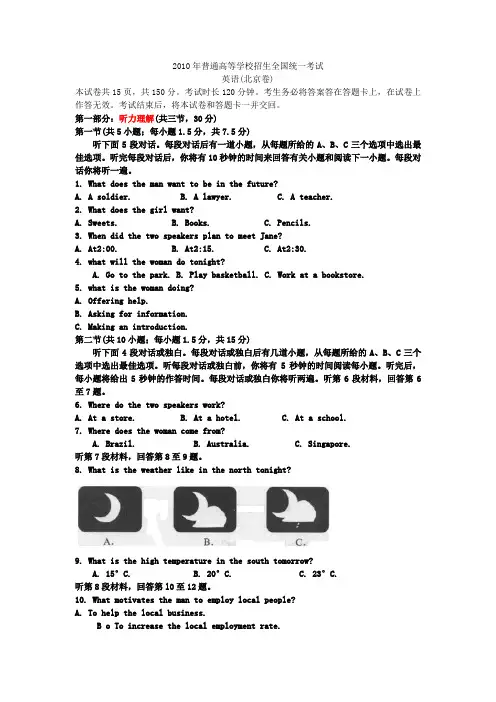
2010年普通高等学校招生全国统一考试英语(北京卷)本试卷共15页,共150分。
考试时长120分钟。
考生务必将答案答在答题卡上,在试卷上作答无效。
考试结束后,将本试卷和答题卡一并交回。
第一部分:听力理解(共三节,30分)第一节(共5小题;每小题1.5分,共7.5分)听下面5段对话。
每段对话后有一道小题,从每题所给的A、B、C三个选项中选出最佳选项。
听完每段对话后,你将有10秒钟的时间来回答有关小题和阅读下一小题。
每段对话你将听一遍。
1. What does the man want to be in the future?A. A soldier.B. A lawyer.C. A teacher.2. What does the girl want?A. Sweets.B. Books.C. Pencils.3. When did the two speakers plan to meet Jane?A. At2:00.B. At2:15.C. At2:30.4. what will the woman do tonight?A. Go to the park.B. Play basketball.C. Work at a bookstore.5. what is the woman doing?A. Offering help.B. Asking for information.C. Making an introduction.第二节(共10小题;每小题1.5分,共15分)听下面4段对话或独白。
每段对话或独白后有几道小题,从每题所给的A、B、C三个选项中选出最佳选项。
听每段对话或独白前,你将有5秒钟的时间阅读每小题。
听完后,每小题将给出5秒钟的作答时间。
每段对话或独白你将听两遍。
听第6段材料,回答第6至7题。
6. Where do the two speakers work?A. At a store.B. At a hotel.C. At a school.7. Where does the woman come from?A. Brazil.B. Australia.C. Singapore.听第7段材料,回答第8至9题。
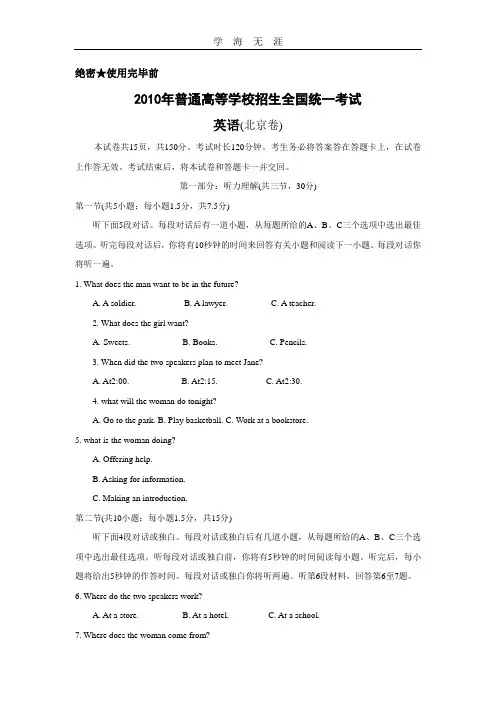
绝密★使用完毕前2010年普通高等学校招生全国统一考试英语(北京卷)本试卷共15页,共150分。
考试时长120分钟。
考生务必将答案答在答题卡上,在试卷上作答无效。
考试结束后,将本试卷和答题卡一并交回。
第一部分:听力理解(共三节,30分)第一节(共5小题;每小题1.5分,共7.5分)听下面5段对话。
每段对话后有一道小题,从每题所给的A、B、C三个选项中选出最佳选项。
听完每段对话后,你将有10秒钟的时间来回答有关小题和阅读下一小题。
每段对话你将听一遍。
1. What does the man want to be in the future?A. A soldier.B. A lawyer.C. A teacher.2. What does the girl want?A. Sweets.B. Books.C. Pencils.3. When did the two speakers plan to meet Jane?A. At2:00.B. At2:15.C. At2:30.4. what will the woman do tonight?A. Go to the park.B. Play basketball.C. Work at a bookstore.5. what is the woman doing?A. Offering help.B. Asking for information.C. Making an introduction.第二节(共10小题;每小题1.5分,共15分)听下面4段对话或独白。
每段对话或独白后有几道小题,从每题所给的A、B、C三个选项中选出最佳选项。
听每段对话或独白前,你将有5秒钟的时间阅读每小题。
听完后,每小题将给出5秒钟的作答时间。
每段对话或独白你将听两遍。
听第6段材料,回答第6至7题。
6. Where do the two speakers work?A. At a store.B. At a hotel.C. At a school.7. Where does the woman come from?A. Brazil.B. Australia.C. Singapore.听第7段材料,回答第8至9题。
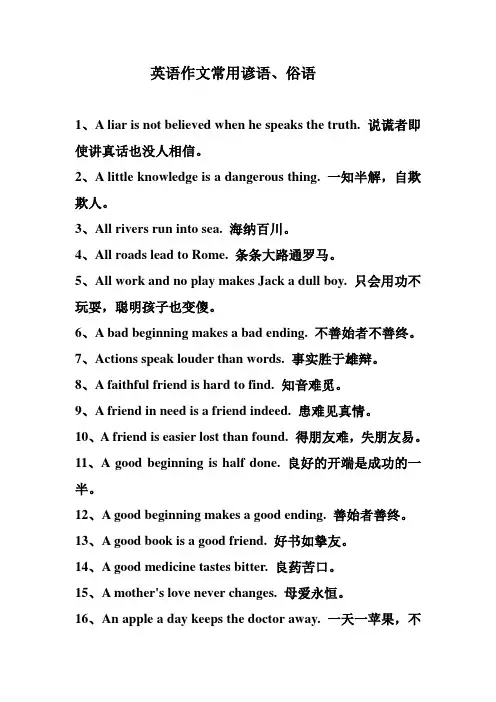
英语作文常用谚语、俗语1、A liar is not believed when he speaks the truth. 说谎者即使讲真话也没人相信。
2、A little knowledge is a dangerous thing. 一知半解,自欺欺人。
3、All rivers run into sea. 海纳百川。
4、All roads lead to Rome. 条条大路通罗马。
5、All work and no play makes Jack a dull boy. 只会用功不玩耍,聪明孩子也变傻。
6、A bad beginning makes a bad ending. 不善始者不善终。
7、Actions speak louder than words. 事实胜于雄辩。
8、A faithful friend is hard to find. 知音难觅。
9、A friend in need is a friend indeed. 患难见真情。
10、A friend is easier lost than found. 得朋友难,失朋友易。
11、A good beginning is half done. 良好的开端是成功的一半。
12、A good beginning makes a good ending. 善始者善终。
13、A good book is a good friend. 好书如挚友。
14、A good medicine tastes bitter. 良药苦口。
15、A mother's love never changes. 母爱永恒。
16、An apple a day keeps the doctor away. 一天一苹果,不用请医生。
17、A single flower does not make a spring. 一花独放不是春,百花齐放春满园。
18、A year's plan starts with spring. 一年之计在于春。
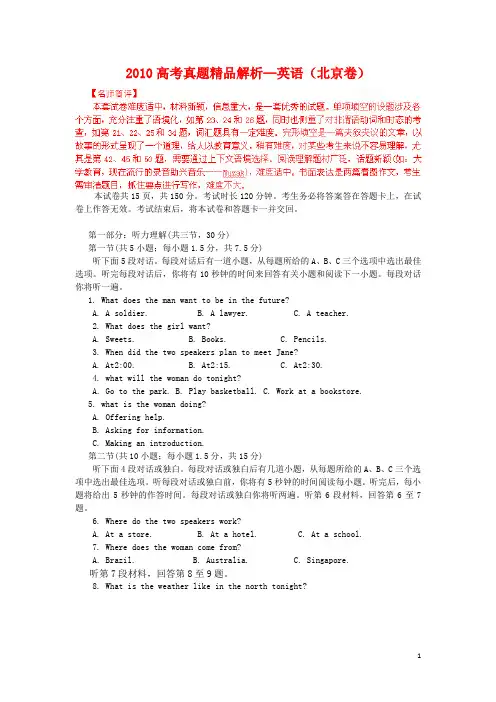
2010高考真题精品解析--英语(北京卷)本试卷共15页,共150分。
考试时长120分钟。
考生务必将答案答在答题卡上,在试卷上作答无效。
考试结束后,将本试卷和答题卡一并交回。
第一部分:听力理解(共三节,30分)第一节(共5小题;每小题1.5分,共7.5分)听下面5段对话。
每段对话后有一道小题,从每题所给的A、B、C三个选项中选出最佳选项。
听完每段对话后,你将有10秒钟的时间来回答有关小题和阅读下一小题。
每段对话你将听一遍。
1. What does the man want to be in the future?A. A soldier.B. A lawyer.C. A teacher.2. What does the girl want?A. Sweets.B. Books.C. Pencils.3. When did the two speakers plan to meet Jane?A. At2:00.B. At2:15.C. At2:30.4. what will the woman do tonight?A. Go to the park.B. Play basketball.C. Work at a bookstore.5. what is the woman doing?A. Offering help.B. Asking for information.C. Making an introduction.第二节(共10小题;每小题1.5分,共15分)听下面4段对话或独白。
每段对话或独白后有几道小题,从每题所给的A、B、C三个选项中选出最佳选项。
听每段对话或独白前,你将有5秒钟的时间阅读每小题。
听完后,每小题将给出5秒钟的作答时间。
每段对话或独白你将听两遍。
听第6段材料,回答第6至7题。
6. Where do the two speakers work?A. At a store.B. At a hotel.C. At a school.7. Where does the woman come from?A. Brazil.B. Australia.C. Singapore.听第7段材料,回答第8至9题。
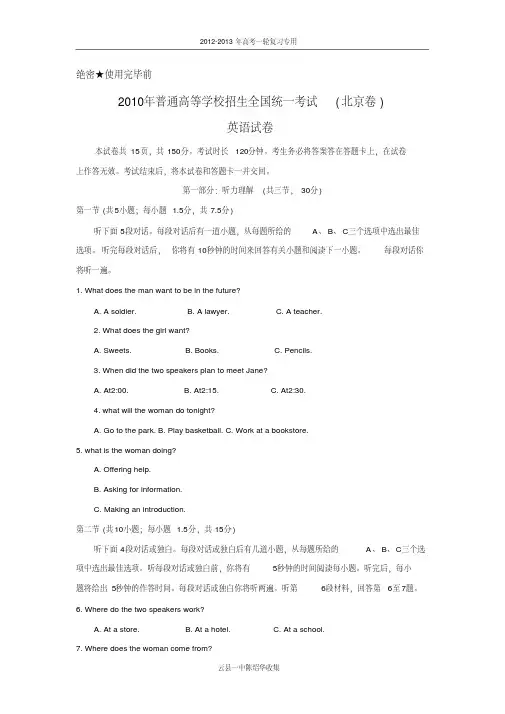
绝密★使用完毕前2010年普通高等学校招生全国统一考试(北京卷)英语试卷本试卷共15页,共150分。
考试时长120分钟。
考生务必将答案答在答题卡上,在试卷上作答无效。
考试结束后,将本试卷和答题卡一并交回。
第一部分:听力理解(共三节,30分)第一节(共5小题;每小题 1.5分,共7.5分)听下面5段对话。
每段对话后有一道小题,从每题所给的A、B、C三个选项中选出最佳选项。
听完每段对话后,你将有10秒钟的时间来回答有关小题和阅读下一小题。
每段对话你将听一遍。
1. What does the man want to be in the future?A. A soldier.B. A lawyer.C. A teacher.2. What does the girl want?A. Sweets.B. Books.C. Pencils.3. When did the two speakers plan to meet Jane?A. At2:00.B. At2:15.C. At2:30.4. what will the woman do tonight?A. Go to the park.B. Play basketball.C. Work at a bookstore.5. what is the woman doing?A. Offering help.B. Asking for information.C. Making an introduction.第二节(共10小题;每小题 1.5分,共15分)听下面4段对话或独白。
每段对话或独白后有几道小题,从每题所给的A、B、C三个选项中选出最佳选项。
听每段对话或独白前,你将有5秒钟的时间阅读每小题。
听完后,每小题将给出5秒钟的作答时间。
每段对话或独白你将听两遍。
听第6段材料,回答第6至7题。
6. Where do the two speakers work?A. At a store.B. At a hotel.C. At a school.7. Where does the woman come from?A. Brazil.B. Australia.C. Singapore. 听第7段材料,回答第8至9题。
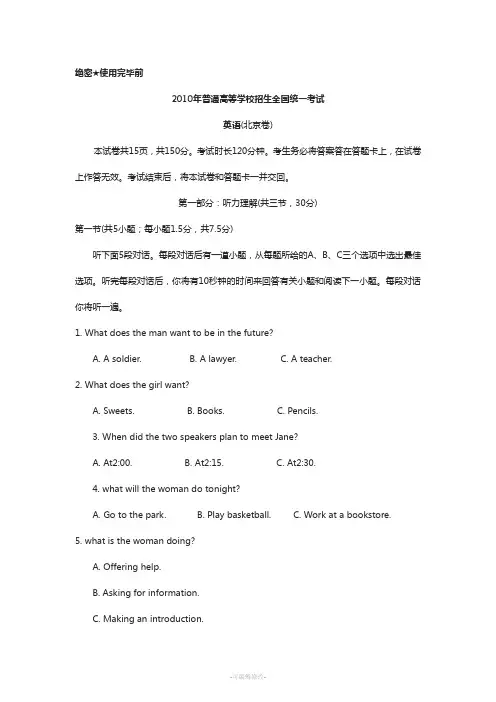
绝密★使用完毕前2010年普通高等学校招生全国统一考试英语(北京卷)本试卷共15页,共150分。
考试时长120分钟。
考生务必将答案答在答题卡上,在试卷上作答无效。
考试结束后,将本试卷和答题卡一并交回。
第一部分:听力理解(共三节,30分)第一节(共5小题;每小题1.5分,共7.5分)听下面5段对话。
每段对话后有一道小题,从每题所给的A、B、C三个选项中选出最佳选项。
听完每段对话后,你将有10秒钟的时间来回答有关小题和阅读下一小题。
每段对话你将听一遍。
1. What does the man want to be in the future?A. A soldier.B. A lawyer.C. A teacher.2. What does the girl want?A. Sweets.B. Books.C. Pencils.3. When did the two speakers plan to meet Jane?A. At2:00.B. At2:15.C. At2:30.4. what will the woman do tonight?A. Go to the park.B. Play basketball.C. Work at a bookstore.5. what is the woman doing?A. Offering help.B. Asking for information.C. Making an introduction.第二节(共10小题;每小题1.5分,共15分)听下面4段对话或独白。
每段对话或独白后有几道小题,从每题所给的A、B、C三个选项中选出最佳选项。
听每段对话或独白前,你将有5秒钟的时间阅读每小题。
听完后,每小题将给出5秒钟的作答时间。
每段对话或独白你将听两遍。
听第6段材料,回答第6至7题。
6. Where do the two speakers work?A. At a store.B. At a hotel.C. At a school.7. Where does the woman come from?A. Brazil.B. Australia.C. Singapore.听第7段材料,回答第8至9题。
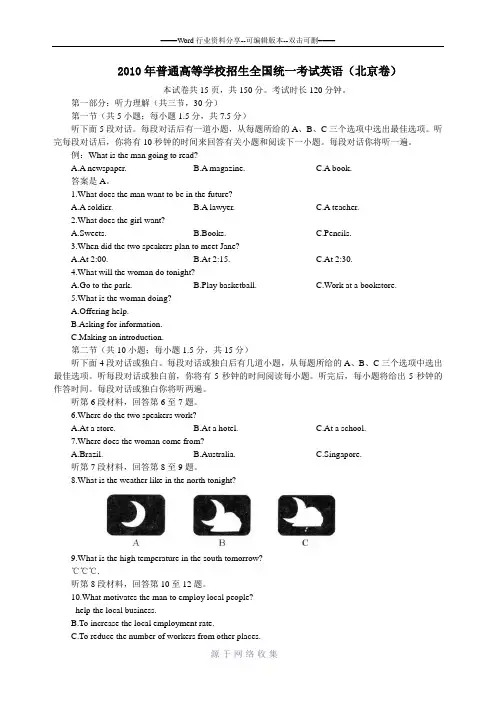
2010年普通高等学校招生全国统一考试英语(北京卷)本试卷共15页,共150分。
考试时长120分钟。
第一部分:听力理解(共三节,30分)第一节(共5小题;每小题1.5分,共7.5分)听下面5段对话。
每段对话后有一道小题,从每题所给的A、B、C三个选项中选出最佳选项。
听完每段对话后,你将有10秒钟的时间来回答有关小题和阅读下一小题。
每段对话你将听一遍。
例:What is the man going to read?A.A newspaper.B.A magazine.C.A book.答案是A。
1.What does the man want to be in the future?A.A soldier.B.A lawyer.C.A teacher.2.What does the girl want?A.Sweets.B.Books.C.Pencils.3.When did the two speakers plan to meet Jane?A.At 2:00.B.At 2:15.C.At 2:30.4.What will the woman do tonight?A.Go to the park.B.Play basketball.C.Work at a bookstore.5.What is the woman doing?A.Offering help.B.Asking for information.C.Making an introduction.第二节(共10小题;每小题1.5分,共15分)听下面4段对话或独白。
每段对话或独白后有几道小题,从每题所给的A、B、C三个选项中选出最佳选项。
听每段对话或独白前,你将有5秒钟的时间阅读每小题。
听完后,每小题将给出5秒钟的作答时间。
每段对话或独白你将听两遍。
听第6段材料,回答第6至7题。
6.Where do the two speakers work?A.At a store.B.At a hotel.C.At a school.7.Where does the woman come from?A.Brazil.B.Australia.C.Singapore.听第7段材料,回答第8至9题。
![2010年全国各地高考英语试题bj卷[Word解析版]](https://uimg.taocdn.com/81509a2f0066f5335a81218d.webp)
绝密★使用完毕前2010年普通高等学校招生全国统一考试英语(北京卷)本试卷共15页,共150分。
考试时长120分钟。
考生务必将答案答在答题卡上,在试卷上作答无效。
考试结束后,将本试卷和答题卡一并交回。
第一部分:听力理解(共三节,30分)第一节(共5小题;每小题1.5分,共7.5分)听下面5段对话。
每段对话后有一道小题,从每题所给的A、B、C三个选项中选出最佳选项。
听完每段对话后,你将有10秒钟的时间来回答有关小题和阅读下一小题。
每段对话你将听一遍。
1. What does the man want to be in the future?A. A soldier.B. A lawyer.C. A teacher.2. What does the girl want?A. Sweets.B. Books.C. Pencils.3. When did the two speakers plan to meet Jane?A. At2:00.B. At2:15.C. At2:30.4. what will the woman do tonight?A. Go to the park.B. Play basketball.C. Work at a bookstore.5. what is the woman doing?A. Offering help.B. Asking for information.C. Making an introduction.第二节(共10小题;每小题1.5分,共15分)听下面4段对话或独白。
每段对话或独白后有几道小题,从每题所给的A、B、C三个选项中选出最佳选项。
听每段对话或独白前,你将有5秒钟的时间阅读每小题。
听完后,每小题将给出5秒钟的作答时间。
每段对话或独白你将听两遍。
听第6段材料,回答第6至7题。
6. Where do the two speakers work?A. At a store.B. At a hotel.C. At a school.7. Where does the woman come from?A. Brazil.B. Australia.C. Singapore.听第7段材料,回答第8至9题。
2010年高考英语(北京卷)真题及答案绝密★使用完毕前2010年普通高等学校招生全国统一考试(北京卷)英语试卷本试卷共15页,共150分。
考试时长120分钟。
考生务必将答案答在答题卡上,在试卷上作答无效。
考试结束后,将本试卷和答题卡一并交回。
第一部分:听力理解(共三节,30分)第一节(共5小题;每小题1.5分,共7.5分)听下面5段对话。
每段对话后有一道小题,从每题所给的A、B、C 三个选项中选出最佳选项。
听完每段对话后,你将有10秒钟的时间来回答有关小题和阅读下一小题。
每段对话你将听一遍。
1. What does the man want to be in the future?A. A soldier.B. A lawyer.C. A teacher.2. What does the girl want?A. Sweets.B. Books.C. Pencils.3. When did the two speakers plan to meet Jane?A. At2:00.B. At2:15.C. At2:30.4. what will the woman do tonight?A. Go to the park.B. Play basketball.C. Work at a bookstore.5. what is the woman doing?A. Offering help.B. Asking for information.C. Making an introduction.第二节(共10小题;每小题1.5分,共15分)听下面4段对话或独白。
每段对话或独白后有几道小题,从每题所给的A、B、C三个选项中选出最佳选项。
听每段对话或独白前,你将有5秒钟的时间阅读每小题。
听完后,每小题将给出5秒钟的作答时间。
每段对话或独白你将听两遍。
听第6段材料,回答第6至7题。
6. Where do the two speakers work?A. At a store.B. At a hotel.C. At a school.7. Where does the woman come from?A. Brazil.B. Australia.C. Singapore.听第7段材料,回答第8至9题。
绝密★使用完毕前2010年普通高等学校招生全国统一考试英语(北京卷)本试卷共15页,共150分。
考试时长120分钟。
考生务必将答案答在答题卡上,在试卷上作答无效。
考试结束后,将本试卷和答题卡一并交回。
第一部分:听力理解(共三节,30分)第一节(共5小题;每小题1.5分,共7.5分)听下面5段对话。
每段对话后有一道小题,从每题所给的A、B、C三个选项中选出最佳选项。
听完每段对话后,你将有10秒钟的时间来回答有关小题和阅读下一小题。
每段对话你将听一遍。
1. What does the man want to be in the future?A. A soldier.B. A lawyer.C. A teacher.2. What does the girl want?A. Sweets.B. Books.C. Pencils.3. When did the two speakers plan to meet Jane?A. At2:00.B. At2:15.C. At2:30.4. what will the woman do tonight?A. Go to the park.B. Play basketball.C. Work at a bookstore.5. what is the woman doing?A. Offering help.B. Asking for information.C. Making an introduction.第二节(共10小题;每小题1.5分,共15分)听下面4段对话或独白。
每段对话或独白后有几道小题,从每题所给的A、B、C三个选项中选出最佳选项。
听每段对话或独白前,你将有5秒钟的时间阅读每小题。
听完后,每小题将给出5秒钟的作答时间。
每段对话或独白你将听两遍。
听第6段材料,回答第6至7题。
6. Where do the two speakers work?A. At a store.B. At a hotel.C. At a school.7. Where does the woman come from?A. Brazil.B. Australia.C. Singapore.听第7段材料,回答第8至9题。
绝密★使用完毕前2010年普通高等学校招生全国统一考试英语(北京卷)本试卷共15页,共150分。
考试时长120分钟。
考生务必将答案答在答题卡上,在试卷上作答无效。
考试结束后,将本试卷和答题卡一并交回。
第一部分:听力理解(共三节,30分)第一节(共5小题;每小题1.5分,共7.5分)听下面5段对话。
每段对话后有一道小题,从每题所给的A、B、C三个选项中选出最佳选项。
听完每段对话后,你将有10秒钟的时间来回答有关小题和阅读下一小题。
每段对话你将听一遍。
1. What does the man want to be in the future?A. A soldier.B. A lawyer.C. A teacher.2. What does the girl want?A. Sweets.B. Books.C. Pencils.3. When did the two speakers plan to meet Jane?A. At2:00.B. At2:15.C. At2:30.4. what will the woman do tonight?A. Go to the park.B. Play basketball.C. Work at a bookstore.5. what is the woman doing?A. Offering help.B. Asking for information.C. Making an introduction.第二节(共10小题;每小题1.5分,共15分)听下面4段对话或独白。
每段对话或独白后有几道小题,从每题所给的A、B、C三个选项中选出最佳选项。
听每段对话或独白前,你将有5秒钟的时间阅读每小题。
听完后,每小题将给出5秒钟的作答时间。
每段对话或独白你将听两遍。
听第6段材料,回答第6至7题。
6. Where do the two speakers work?A. At a store.B. At a hotel.C. At a school.7. Where does the woman come from?A. Brazil.B. Australia.C. Singapore.听第7段材料,回答第8至9题。
2010年普通高等学校招生全国统一考试(北京卷)英语试卷本试卷共15页,共150分。
考试时长120分钟。
考生务必将答案答在答题卡上,在试卷上作答无效。
考试结束后,将本试卷和答题卡一并交回。
第一部分:听力理解(共三节,30分)第一节(共5小题;每小题1.5分,共7.5分)听下面5段对话。
每段对话后有一道小题,从每题所给的A、B、C三个选项中选出最佳选项。
听完每段对话后,你将有10秒钟的时间来回答有关小题和阅读下一小题。
每段对话你将听一遍。
1. What does the man want to be in the future?A. A soldier.B. A lawyer.C. A teacher.2. What does the girl want?A. Sweets.B. Books.C. Pencils.3. When did the two speakers plan to meet Jane?A. At2:00.B. At2:15.C. At2:30.4. what will the woman do tonight?A. Go to the park.B. Play basketball.C. Work at a bookstore.5. what is the woman doing?A. Offering help.B. Asking for information.C. Making an introduction.第二节(共10小题;每小题1.5分,共15分)听下面4段对话或独白。
每段对话或独白后有几道小题,从每题所给的A、B、C三个选项中选出最佳选项。
听每段对话或独白前,你将有5秒钟的时间阅读每小题。
听完后,每小题将给出5秒钟的作答时间。
每段对话或独白你将听两遍。
听第6段材料,回答第6至7题。
6. Where do the two speakers work?A. At a store.B. At a hotel.C. At a school.7. Where does the woman come from?A. Brazil.B. Australia.C. Singapore.听第7段材料,回答第8至9题。
绝密★使用完毕前2010年普通高等学校招生全国统一考试(北京卷)英语试卷本试卷共15页,共150分。
考试时长120分钟。
考生务必将答案答在答题卡上,在试卷上作答无效。
考试结束后,将本试卷和答题卡一并交回。
第一部分:听力理解(共三节,30分)第一节(共5小题;每小题1.5分,共7.5分)听下面5段对话。
每段对话后有一道小题,从每题所给的A、B、C三个选项中选出最佳选项。
听完每段对话后,你将有10秒钟的时间来回答有关小题和阅读下一小题。
每段对话你将听一遍。
1. What does the man want to be in the future?A. A soldier.B. A lawyer.C. A teacher.2. What does the girl want?A. Sweets.B. Books.C. Pencils.3. When did the two speakers plan to meet Jane?A. At2:00.B. At2:15.C. At2:30.4. what will the woman do tonight?A. Go to the park.B. Play basketball.C. Work at a bookstore.5. what is the woman doing?A. Offering help.B. Asking for information.C. Making an introduction.第二节(共10小题;每小题1.5分,共15分)听下面4段对话或独白。
每段对话或独白后有几道小题,从每题所给的A、B、C三个选项中选出最佳选项。
听每段对话或独白前,你将有5秒钟的时间阅读每小题。
听完后,每小题将给出5秒钟的作答时间。
每段对话或独白你将听两遍。
听第6段材料,回答第6至7题。
6. Where do the two speakers work?A. At a store.B. At a hotel.C. At a school.7. Where does the woman come from?A. Brazil.B. Australia.C. Singapore.听第7段材料,回答第8至9题。
8. What is the weather like in the north tonight?9. What is the high temperature in the south tomorrow?A. 15°C.B. 20°C. C. 23°C. 听第8段材料,回答第l0至12题。
10. What motivates the man to employ local people?A. To help the local business.B o To increase the local employment rate.C. To reduce the number of workers from other places.11. What will the man probably do in the future?A. Set up a new company.B. Run a training course.C. Lead an easier life.12. What is the possible relationship between the two speakers?A. Supplier and customer.B. Manager and secretary.C. Interviewer and interviewee.13. What rule should you follow if you want to enter the sports complex?A. Wear appropriate shoes.B. Register on the notice board.C. Make an appointment with a coach.14. How much is the buffet?A. £4.B. £8.C. £10.15. What is the purpose of the announcement?A. To introduce a playing field.B. To introduce a holiday camp.C. To introduce a fruit market.第三节(共5小题;每小题l.5分,共7.5分)听下面一段对话,完成第l6至第20五道小题,每小题仅填写一个词。
听对话前,你将有20秒钟的时间阅读试题,听完后你将有60秒钟的作答时间。
这段对话你将听两遍。
第二部分:知识运用(共两节,45分)第一节单项填空(共15小题;每小题l分,共15分)从每题所给的A、B、C、D四个选项中,选出可以填入空白处的最佳选项,并在答题卡上将该项涂黑。
21. at my classmates' faces, I read the same excitement in their eyes.A. LookingB. LookC. To lookD. Looked22. In the spoken English of some areas in the US, the "r" sounds at the end of thewords .A. are droppedB. dropC. are being droppedD. have dropped23. ---Good morning. I've got an appointment with Miss Smith in the PersonnelDepartment.--Ah, good morning. You be Mrs. Peters.A. mightB. mustC. wouldD. can24. --I'm not finished with my dinner yet.--But our friends for us.A. will waitB. waitC. have waitedD. are waiting25. I'm calling to enquire about the position in yesterday's China Daily.A. advertisedB. to be advertisedC. advertisingD. having advertised26. --I'm sorry, but I don't quite follow you. Did you say you wanted to return on September 20?--Sorry, I myself clear. We want to return on October 20.A. hadn't madeB. wouldn't makeC. don't makeD. haven't made27. Children who are not active or diet is high in fat will gain weight quickly.A. whatB. whoseC. whichD. that28. It took me a long time before I was able to fully appreciate what they __ for me.A. had doneB. didC. would doD. were doing29. Would you mind not picking the flowers in the garden? They are everyone's enjoyment.A. inB. atC. forD. to30. they decide which college to go to, students should research the admissionprocedures.A. AsB. WhileC. UntilD. Once31. I want to be liked and loved for I am inside.A. whoB. whereC. whatD. how32. Part of the reason Charles Dickens loved his own novel, David Copperfield, was__ it was rather closely modeled on his own life.A. whatB. thatC. whyD. whether33. some people regard as a drawback is seen as a plus by many others.A. WhetherB. WhatC. ThatD. How34. --The weather has been very hot and dry.--Yes. If it had rained even a drop, things would be much better now! And my vegetables .A. wouldn't dieB. didn't dieC. hadn't diedD. wouldn't have died35. First impressions are the most lasting. After all, you never get __ second chance to make __first impression.A. a; theB. the; theC. a; aD. the; a第二节完形填空(共20小题;每小题l.5分,共30分)阅读下面短文,掌握其大意,从每题所给的A、B、C、D四个选项中,选出最佳选项,并在答题卡上将该项涂黑。
I met Mrs. Neidl in the ninth grade on a stage-design team for a play and she was one of the directors. Almost instantly I loved her. She had an Unpleasant voice and a direct way of speaking, 36 she was encouraging and inspiring. For some reason, she was impressed with my work and me.Mrs. Neidl would ask me for my 37 . She wanted to know how I thought we should 38 things. At first I had no idea how to answer because I knew 39 about stage design! But I slowly began to respond to her 40 . It was cause and effect: She believed I had opinions, so I began to 41 them. She trusted me to complete things, so I completed them perfectly. She loved how 42 I was, so I began to show up to paint more and more. She believed in me, so I began to believe in myself.Mrs. Neidl's 43 that year was, "Try it. We can always paint over it 44 !"I began to take 45 . I had been so afraid of failing but suddenly there was no failing--only things to be 46 upon. I learned to dip my brush into the paint and 47 create something.The shy, quiet freshman achieved success that year. I was 48 in the programas "Student Art Assistant" because of the time and effort I'd put in. It was that year that I 49 I wanted to spend the rest of my life doing stage design.Being on that stage-design team 50 Mrs. Neidl changed me completely. Not only was I stronger and more competent than I had thought, but I also 51 a strong interest and a world I hadn't known existed. She taught me not to 52 what people think I should do: She taught me to take chances and not be 53 . Mrs. Neidl was my comforter when I was upset. Her 54 in me has inspired me to do things that I never imagined 55 .36. A. and B. yet C. so D. for37. A. opinion B. impression C. information D. intention38. A. make B. keep C. handle D. change39. A. anything B. something C. everything D. nothing40. A. questions B. comments C. explanations D. remarks41. A. hold B. follow C. evaluate D. form42. A. happy B. lively C. reliable D. punctual43. A. message B. motto C. saying D. suggestion44. A. again B. more C. instead D. later45. A. steps B. control C. charge D. risks46. A. improved B. acted C. looked D. reflected47. A. easily B. carefully C. confidently D. proudly48. A. introduced B. recognized C. identified D. considered49. A. confirmed B. decided C. realized D. acknowledged50. A. with B. below C. of D. by51. A. developed B. discovered C. took D. fostered52. A. accept B. care C. judge D. wonder53. A. bored B. lazy C. sad D. afraid54. A. trust B. patience C. curiosity Do interest55. A. accessible B. enjoyable C. possible D. favorable第三部分:阅读理解(共两节,40分)第一节(共15小题;每小题2分,共30分)阅读下列短文,从每题所给的A、B、C、D四个选项中,选出最佳选项,并在答题卡上将该项涂黑。